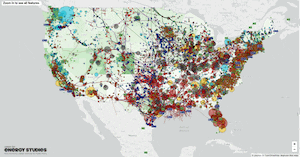US energy infrastructure mapped by Baker Institute

Interactive tool aims to improve analysis of country’s capabilities
HOUSTON – A new, interactive energy map for the United States has just been released by Rice University’s Baker Institute for Public Policy, providing an open-source visualization of the country’s energy infrastructure and demography designed to highlight the intersection of energy, environment, policy and society.
The map, titled Energy, Environment and Policy in the U.S., displays the nation’s critical energy infrastructure and environmental points of interest, as well as relevant election and demographics statistics at different levels of granularity. Users can utilize various layers and explore facility-level details with the click of a mouse.
Shih Yu (Elsie) Hung, a research manager at the Baker Institute Center for Energy Studies, and Kenneth Medlock, the James A. Baker III and Susan G. Baker Fellow in Energy and Resource Economics at the Baker Institute and senior director of the Center for Energy Studies, created the map to better understand the nexus of energy and society.
“We hope to stimulate and facilitate pertinent discussions and research with this interactive tool,” wrote Hung and Medlock. “More importantly, it allows the users to effectively navigate key energy and environmental issues with a clear and complete picture of the nation’s infrastructure and demography.”
The map can be accessed directly here. It will be updated regularly to incorporate additional relevant layers and reflect the most recent data available.
To schedule an interview with Hung or Medlock, or for more information, contact Avery Franklin, media relations specialist at Rice, at [email protected] or 713-348-6327.
This news release can be found online at news.rice.edu.
Follow the Baker Energy Studies via Twitter @CES_Baker_Inst.
Follow Rice News and Media Relations on Twitter @RiceUNews.
Founded in 1993, Rice University’s Baker Institute ranks as the No. 1 university-affiliated think tank in the world and the No. 1 energy think tank in the world. As a premier nonpartisan think tank, the institute conducts research on domestic and foreign policy issues with the goal of bridging the gap between the theory and practice of public policy. The institute’s strong track record of achievement reflects the work of its endowed fellows, Rice University faculty scholars and staff, coupled with its outreach to the Rice student body through fellow-taught classes — including a public policy course — and student leadership and internship programs. Learn more about the institute at www.bakerinstitute.org or on the institute’s blog, http://blog.bakerinstitute.org.
Located on a 300-acre forested campus in Houston, Rice University is consistently ranked among the nation’s top 20 universities by U.S. News & World Report. Rice has highly respected schools of Architecture, Business, Continuing Studies, Engineering, Humanities, Music, Natural Sciences and Social Sciences and is home to the Baker Institute for Public Policy. With 4,052 undergraduates and 3,484 graduate students, Rice’s undergraduate student-to-faculty ratio is just under 6-to-1. Its residential college system builds close-knit communities and lifelong friendships, just one reason why Rice is ranked No. 1 for lots of race/class interaction and No. 1 for quality of life by the Princeton Review. Rice is also rated as a best value among private universities by Kiplinger’s Personal Finance.


